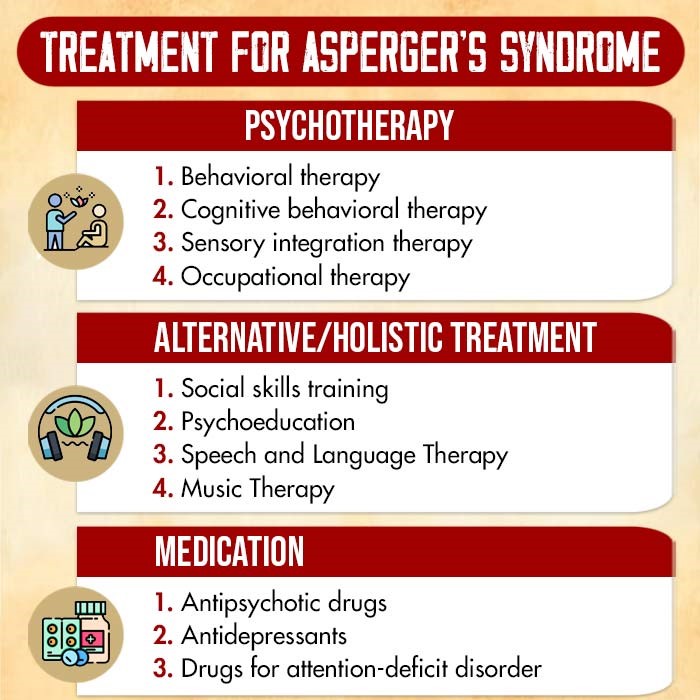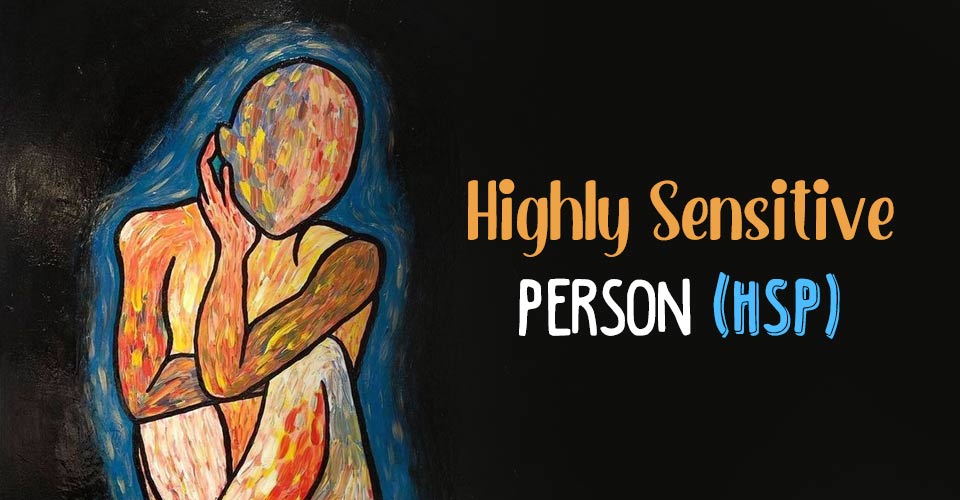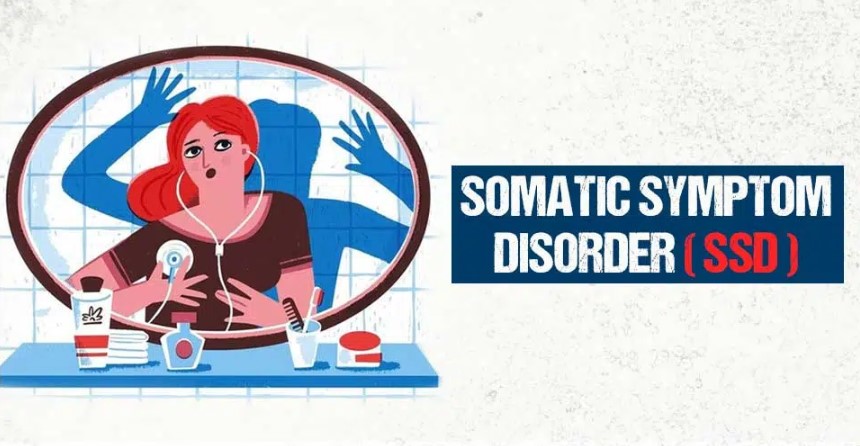The treatment for Asperger’s syndrome, a neurodevelopmental disorder on the autism spectrum, focuses on providing individuals with effective strategies and interventions to enhance their social and behavioral skills, as well as their quality of life.
Living With Asperger’s Syndrome
People with Asperger’s syndrome have difficulty [mfn] Hosseini, S. A., & Molla, M. (2023). Asperger Syndrome. PubMed; StatPearls Publishing. Available from: https://www.ncbi.nlm.nih.gov/books/NBK557548/#:~:text=Absent%20or%20limited%20interest%20in [/mfn] understanding social cues, making eye contact, and engaging in small talk. They also face communication challenges like difficulties in understanding sarcasm, figurative language, and tone of voice. They often have specific interests and routines and may become upset when these are disrupted.
They also experience uncomfortable hypersensitivity to noise, lights, or textures. In fact, due to the incurable nature and life-long prevalence of this disorder, the affected may face constant obstacles in navigating academic, professional, and interpersonal settings.
Read More About Asperger’s Syndrome Here
The Objective Of Treatment For Asperger’s Syndrome
Early medical interventions for Asperger’s syndrome and consistent social support can lead to positive outcomes and improved quality of life for individuals—adult or child—with the disorder. In most cases, the main goal of Asperger’s syndrome treatment is to reduce the symptoms and enhance the individual’s ability to function independently.
Treatment [mfn] Szatmari P. (1991). Asperger’s syndrome: diagnosis, treatment, and outcome. The Psychiatric clinics of North America, 14(1), 81–93. [/mfn] also focuses on maximizing functional independence, minimizing core deficits, reducing problematic behaviors, and improving symptoms such as repetitive routines, obsessions, clumsiness, and so forth.

Asperger’s Syndrome Treatment Methods
Common [mfn] Hosseini, S. A., & Molla, M. (2021). Asperger Syndrome. PubMed; StatPearls Publishing. Available from: https://www.ncbi.nlm.nih.gov/books/NBK557548/ [/mfn] Asperger’s syndrome treatment methods used to treat Asperger’s syndrome include:
1. Behavioral therapy
Behavioral therapy is the most common therapy for Asperger’s syndrome treatment. It focuses on helping the affected individuals develop social and communication skills, as well as managing repetitive behaviors and interests.
Behavioral therapy (like cognitive-behavioral therapy) may involve individual sessions with a therapist or participation in social skills groups where individuals can practice and learn social skills in a supportive environment.
2. Sensory integration therapy
Sensory integration therapy involves using specific techniques and activities to help individuals better tolerate and process sensory input (such as sensitivity to certain sounds or textures). These strategies help to reduce sensory overload and improve their daily functioning.
3. Social skills training
Social skills training is often incorporated into treatment plans for Asperger’s syndrome. It focuses on teaching individuals with Asperger’s syndrome how to interact more effectively with others in social situations.
This may include teaching skills such as initiating conversations, maintaining eye contact, interpreting nonverbal cues, and understanding social norms and expectations. Social skills training can be done through individual therapy sessions, group therapy, or structured social skills programs.
The most common social skills training programs involve evidence-based music or speech and language therapies. Music therapy helps individuals with Asperger’s syndrome develop social skills through rhythm, melody, and group interaction, while speech and language therapies may target communication skills, such as understanding social cues, conversational skills, and body language.
4. Occupational therapy
Occupational therapy can help individuals with Asperger’s syndrome develop practical skills that are important for daily functioning, such as time management, organization, and self-care skills. This form of therapy may also focus on helping the affected identify and develop their strengths and interests, which can help improve their overall quality of life.
5. Pharmacotherapy
While there is no specific [mfn] LeClerc, S., & Easley, D. (2015). Pharmacological therapies for autism spectrum disorder: a review. P & T : a peer-reviewed journal for formulary management, 40(6), 389–397. [/mfn] Asperger’s syndrome medication, some individuals may benefit from medications to manage associated conditions, such as anxiety or depression. Most recently, mild antipsychotic and psychotropic drugs have been approved for the syndrome’s treatment of some of the associated symptoms—such as irritability, aggression, and repetitive behaviors.
Non-pharmacological Interventions For Asperger’s Syndrome
Educational interventions [mfn] Hosseini, S. A., & Molla, M. (2021). Asperger Syndrome. PubMed; StatPearls Publishing. Available from: https://www.ncbi.nlm.nih.gov/books/NBK557548/ [/mfn] are often a critical component of treatment for Asperger’s syndrome. These may include strategies to improve academic performance and help individuals develop social and communication skills.
Educational interventions may involve modifications to the individual’s educational environment, such as providing additional support in the classroom, creating individualized education plans (IEPs) [mfn] Odom, S. L., Hall, L. J., Morin, K. L., Kraemer, B. R., Hume, K. A., McIntyre, N. S., Nowell, S. W., Steinbrenner, J. R., Tomaszewski, B., Sam, A. M., & DaWalt, L. (2021). Educational Interventions for Children and Youth with Autism: A 40-Year Perspective. Journal of autism and developmental disorders, 51(12), 4354–4369. https://doi.org/10.1007/s10803-021-04990-1 [/mfn], or offering specialized instruction tailored to the individual’s needs.
Assistive technologies such as visual schedules, social stories, and communication devices may also be used to support communication and daily functioning. It is important to work with qualified healthcare professionals to determine the most appropriate non-pharmacological interventions for each individual with Asperger’s syndrome.
Managing Asperger’s Syndrome In The Long-run
Managing Asperger’s syndrome, in the long run, requires a comprehensive approach that involves regular assessments, individualized treatment plans, and ongoing support. While Asperger’s syndrome is an incurable disorder with life-long prevalence, individuals with Asperger’s can still thrive and achieve their full potential with appropriate support.
Families of individuals with Asperger’s can also benefit from social and professional support to better understand and cope with the challenges associated with the condition. For instance, developmental interventions [mfn] Catalano, D., Holloway, L., & Mpofu, E. (2018). Mental Health Interventions for Parent Carers of Children with Autistic Spectrum Disorder: Practice Guidelines from a Critical Interpretive Synthesis (CIS) Systematic Review. International journal of environmental research and public health, 15(2), 341. https://doi.org/10.3390/ijerph15020341 [/mfn] coupled with parental skill-based psychoeducation [mfn] Kalalo, R. T., Yuniar, S., & Ariyanto, F. C. (2021). Effect of parental skills-based psychoeducation intervention on parental stress index and severity of children with autism spectrum disorders: A pilot study. Annals of medicine and surgery (2012), 70, 102873. https://doi.org/10.1016/j.amsu.2021.102873 [/mfn] can improve the relationship between the patient and his/her respective guardian or caregivers.
Additionally, practicing self-care strategies [mfn] Roy, M., Dillo, W., Emrich, H. M., & Ohlmeier, M. D. (2009). Asperger’s syndrome in adulthood. Deutsches Arzteblatt international, 106(5), 59–64. https://doi.org/10.3238/arztebl.2009.0059 [/mfn] such as regular exercise, a healthy diet, sufficient sleep, and stress management techniques can help individuals with Asperger’s syndrome and their caregivers cope with the difficulties that come along the way.
Takeaway
Treatment for Asperger’s syndrome typically involves a multidisciplinary approach comprising therapies and, in some cases, pharmacotherapy. The specific treatment plan may vary depending on the individual’s unique needs and symptoms, and it is important to work with a qualified healthcare professional to develop an individualized treatment plan that best caters to the affected person’s needs.
At A Glance
- Treatment for Asperger’s syndrome focuses on enhancing social and behavioral skills, as well as the quality of life.
- Common treatment methods include behavioral therapy, sensory integration therapy, social skills training, occupational therapy, and pharmacotherapy.
- Educational interventions and assistive technologies may also be used.
- Long-term management requires regular assessments, individualized treatment plans, ongoing support, and self-care strategies.
- A multi-disciplinary approach is typically used, and working with a qualified healthcare professional is important to develop an individualized treatment plan.
Frequently Asked Questions (FAQs)
1. Is Asperger’s syndrome a disability?
Asperger’s syndrome is a developmental disability affecting how people behave, see, understand the world, and interact with others.
2. What type of therapy works best for Asperger’s syndrome?
Behavioral therapies comprise the foremost therapy for Asperger’s syndrome.
3. Can Asperger’s syndrome be treated with medication?
Asperger’s syndrome medication is not common. However, certain medications may be prescribed to manage co-occurring conditions such as anxiety, depression, or ADHD.
4. How can one treat Asperger’s syndrome in adults?
Adults with Asperger’s syndrome can be treated with therapy and medication. They can also benefit from social skills training, self-help coping strategies, social support from friends and family, and practicing effective self-care.
5. Can people with Asperger’s syndrome improve over time?
Yes, with appropriate support and interventions, individuals with Asperger’s syndrome can improve their social, communication, and behavioral skills over time.









